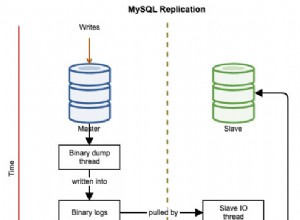Você deve pensar sobre a normalização. No entanto, para o esquema atual, considere o seguinte
mysql> select * from frontend_users ;
+------+-----------+---------+
| uid | usergroup | name |
+------+-----------+---------+
| 1 | 1,2,3 | Michael |
| 2 | 2 | Tobias |
| 3 | 1 | Colin |
+------+-----------+---------+
3 rows in set (0.00 sec)
mysql> select * from usergroup ;
+------+----------+
| uid | title |
+------+----------+
| 1 | member |
| 2 | reporter |
| 3 | admin |
+------+----------+
3 rows in set (0.00 sec)
Para obter o resultado desejado você pode usar a seguinte consulta que não é eficiente para longo prazo
select
u.uid,
u.name,
group_concat(g.title) as groups
from frontend_users u
join usergroup g on find_in_set(g.uid,u.usergroup) > 0
group by u.uid ;
+------+---------+-----------------------+
| uid | name | groups |
+------+---------+-----------------------+
| 1 | Michael | admin,reporter,member |
| 2 | Tobias | reporter |
| 3 | Colin | member |
+------+---------+-----------------------+
Agora, uma abordagem melhor seria criar uma tabela de associação como
mysql> create table user_to_group (uid int, gid int);
Query OK, 0 rows affected (0.15 sec)
mysql> insert into user_to_group values (1,1),(1,2),(1,3),(2,2),(3,1);
Query OK, 5 rows affected (0.02 sec)
Records: 5 Duplicates: 0 Warnings: 0
E uma consulta melhor seria
select
u.uid,
u.name,
group_concat(g.title) as groups
from frontend_users u
join user_to_group ug on ug.uid = u.uid
join usergroup g on g.uid = ug.gid
group by u.uid ;
+------+---------+-----------------------+
| uid | name | groups |
+------+---------+-----------------------+
| 1 | Michael | member,admin,reporter |
| 2 | Tobias | reporter |
| 3 | Colin | member |
+------+---------+-----------------------+




